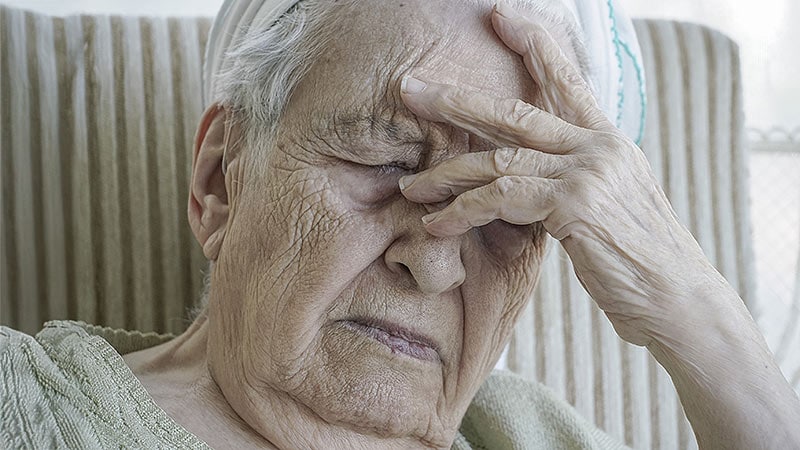TOPLINE:
Increasing 24-hour sleepiness in women in their 80s was associated with a doubling in risk for dementia compared with their peers with stable sleep patterns, a new study showed.
METHODOLOGY:
- Researchers analyzed 733 women without probable cognitive impairment (mean age, 82.5 years; 91% White) who were enrolled in the Study of Osteoporotic Fractures.
- Participants were monitored using wrist actigraphy at baseline and follow-up visits over a median of 5 years.
- The primary outcome was cognitive status, evaluated at follow-up using neuropsychological tests, including the Modified Mini-Mental State Examination, California Verbal Learning Test (Second Edition), and Trail Making Test Part B.
- Multidimensional sleep-wake change profiles were assessed on the basis of nighttime sleep, napping, and circadian rest-activity rhythm parameters.
- Participants were divided into three groups: Stable sleep (n = 321), declining nighttime sleep (n = 256), and increased sleepiness (n = 156).
TAKEAWAY:
- About 22% of participants developed mild cognitive impairment (MCI), and 13% developed dementia during the follow-up period.
- After adjusting for covariates such as age, comorbidities, and APOE-ε4 allele status, women with increasing 24-hour sleepiness had more than double the risk for dementia as women with stable sleep (odds ratio [OR], 2.21; 95% CI, 1.14-4.26). The association with dementia was attenuated in women with declining nighttime sleep.
- Individual sleep parameters that were associated with a significantly increased risk for dementia included changes in sleep efficiency (OR, 2.2), wake after sleep onset (OR, 2.3), nap duration (OR, 2.0), and nap frequency (OR, 2.2).
- No significant associations were found between dementia risk and total sleep time and circadian rest-activity rhythm parameters. Similarly, no associations were found between MCI risk and sleep-wake change profiles or any individual parameter.
IN PRACTICE:
“It is unknown if worsening sleep increases the risk of dementia or if dementia leads to worsening sleep. Some scientists believe both theories may be correct,” co-investigator Yue Leng, PhD, University of California, San Francisco, said in a press release.
Still, the authors of an accompanying editorial wrote that “Initiatives focusing on improving sleep efficiency, encouraging lifestyle changes, and implementing cognitive interventions may be essential in mitigating dementia risk in the aging population.”
SOURCE:
This study was led by Sasha Milton, University of California, San Francisco. The editorial was led by Marino Muxfeldt Bianchin, Hospital de Clínicas de Porto Alegre, Porto Alegre, Brazil. Both papers were published online on March 19 in Neurology.
LIMITATIONS:
The study sample included mostly White women in their 80s, which restricted the generalizability of the findings to more diverse populations. The 5-year observation period and concurrent cognitive assessment made it difficult to establish a temporal relationship between sleep changes and dementia onset. The lack of disease biomarker analysis further restricted the drawing of conclusions about dementia pathology. Additionally, the observational study design prevented the establishment of causal inferences.
DISCLOSURES:
This study was funded by the National Institutes of Health/National Institute on Aging, and the Study of Osteoporotic Fractures was funded by the National Institutes of Health. The investigators and editorialists reported no relevant conflicts of interest.
This article was created using several editorial tools, including AI, as part of the process. Human editors reviewed this content before publication.
Source link : https://www.medscape.com/viewarticle/sleep-wake-changes-flag-dementia-risk-women-2025a100085g?src=rss
Author :
Publish date : 2025-04-04 11:03:00
Copyright for syndicated content belongs to the linked Source.
